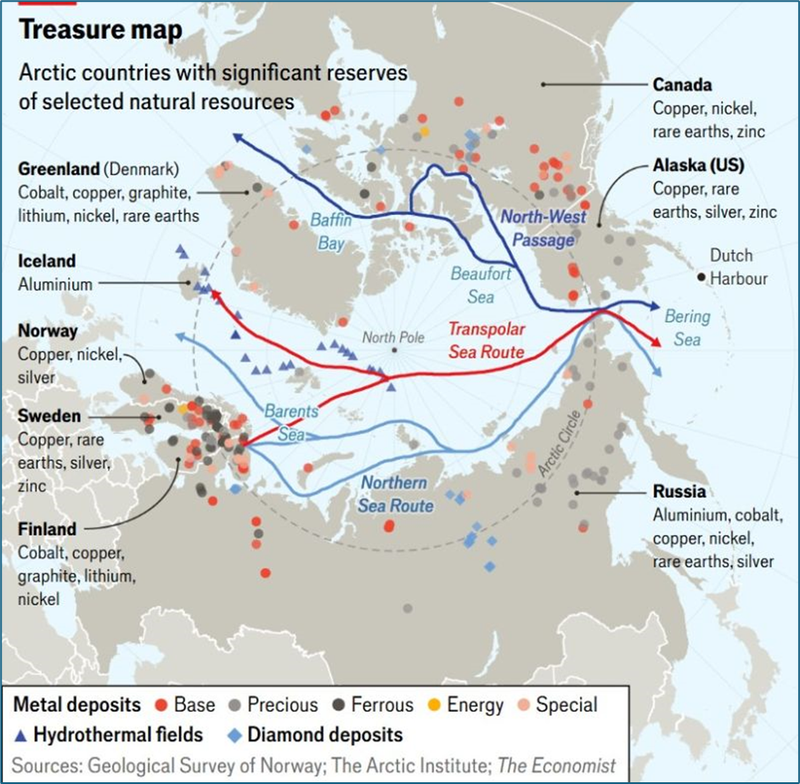Arctic collaborations and energy shifts

President Trump's interest in rare earths and President Putin's interests in developing the Arctic economy and shipping paint a possible framework for the two countries to cohabit on the planet. U.S.-Russian delegations in Riyadh identified "specific areas of cooperation," including "joint projects in the Arctic," which is believed to have 13 percent of uncertified oil globally and 30 percent of untapped natural gas reserves. In addition, the United States and Russia are interested in accelerating exploration and extraction of critical raw materials such as copper, cobalt and rare earths in the Arctic. It doesn't take much thought to recognize on a map centered at the North Pole how metals are concentrated on the peripheral shores of continents. Particular concentration density occurs in Finland, Sweden and Canada. By similar motivation, Exxon and Chevron were setting up hedge funds to develop fast gas export activities, including in the Arctic Circle, to meet projected needs for artificial intelligence and data centers. The gas plants will be designed to incorporate carbon capture and storage. Chevron is entering power generation just months after Exxon announced plans to build natural gas power plants to power artificial intelligence data centers. It is estimated that several 4 gigawatt power plants will be needed by 2027 at a cost of at least €8 billion dollars.
In Europe, events have different odors. Despite the frenetic speed and variety of the February negotiations, Russia and especially Ukraine attacked oil facilities on both sides in January and February. The February 17 attack by the Ukrainian air force on a compressor station of the pipeline in Novorossiysk on the Black Sea coast will reduce the flow of oil to the pipeline for two months. It is especially annoying for Russians, American, English, Italian and of course Kazakh shareholders of the CPC (Caspian Petroleum Consortium) pipeline, especially because the Tengiz field showed a decrease in production from 2022. In 2021, this pipeline exported up to 1.3 million barrels of good quality oil per day, which accounted for 80% of Kazakhstan's total oil production of 1.6 million barrels (14% of global production). It is understood that despite the new package of sanctions against Russia imposed on January 10, 2025, the U.S. Treasury Department granted exemptions for CPC-related oilfield services. In mid-January 2025, the drone attack on Turkstream was Ukraine's third attempt. This Russian pipeline supplies Turkey with 14 Bcm and Central Europe and Greece with 17.5 Bcm of natural gas also through the Black Sea. The risk of widespread sabotage of the Black Sea submarine cables and pipelines remains and extends to the Aegean Sea and the Southeastern Mediterranean. The production of hydrocarbons, as well as the timely laying of electricity interconnection cables between Greece and Cyprus, fall within this framework.
This general web of risks includes the recent sabotage of various telecommunications cables in the shallow Baltic Sea, as well as the sabotage of the two Nord Stream 1 pipelines and one of the two Nord Stream 2 pipelines destroyed in 2022. Interestingly, an American Republican businessman has submitted a proposal to the US administration to review the possibility of restoring Nord Stream 2 with Denmark showing particular interest. The difficulty of the US to flood Europe with LNG before 2027 and the recent developments in the negotiations between the US and Russia, foreshadow continued and perhaps increasing arrival of Russian LNG and partial reopening of part of Russian pipelines for tactical reasons until 2027. The EU is in a difficult phase and its stability is necessary not only for Europe but also for the US. The situation is a bit like that of Israel's support for natural gas to Egypt and Jordan to maintain stability in the region. The other option is to use part of Nord Stream 2 for the creation of a hub in the Baltic.
The achievement of peace in the wider European area seems to be based on a dual US export model, peace and arms industry. The EU will be forced to buy more weapons systems from the US to correct its NATO membership, and therefore weapons production will be sold for the defensive reorganisation of NATO members instead of going to Ukraine and Gaza. In terms of American exports, it is more profitable and also helps to achieve peace in the European area and the Southeast Mediterranean, against the background of China.
https://www.defence-point.gr/news/arktikes-synergasies-kai-energeiakes-anakatataxeis